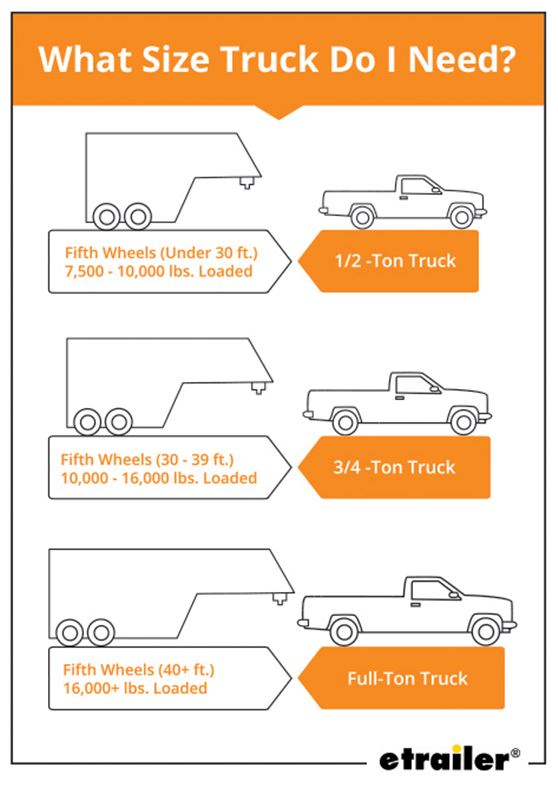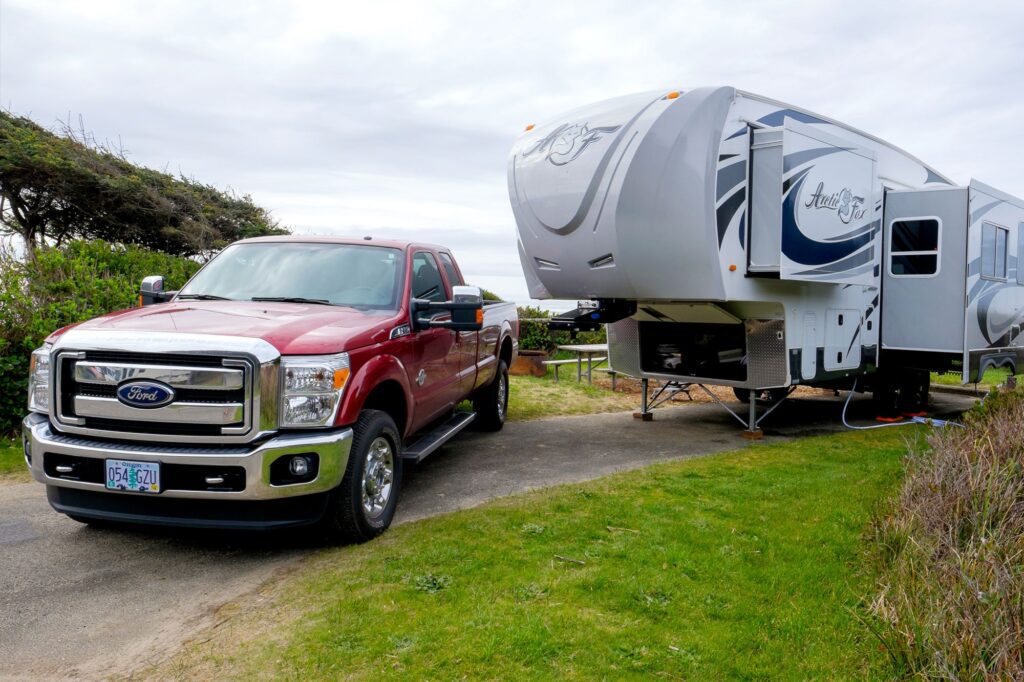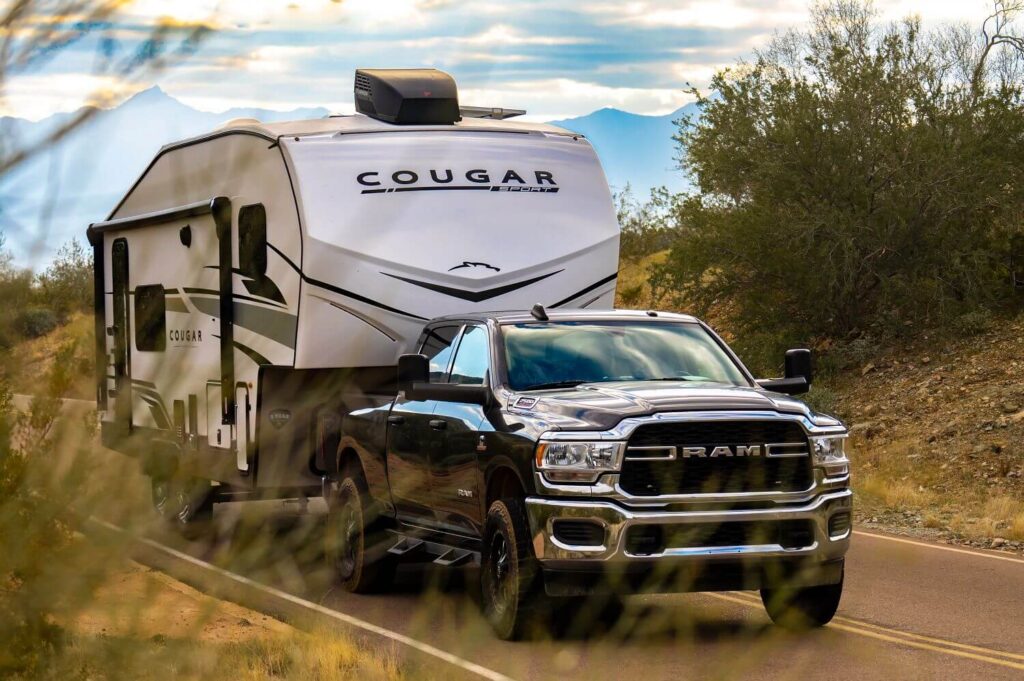Determining the appropriate size truck to effectively tow a 10,000-pound camper is a fundamental consideration for any outdoor enthusiast. From ensuring a smooth and safe journey to maximizing the vehicle’s towing capacity, the implications of selecting the right truck are vast. In this article, we will explore the factors to consider, such as engine power and weight distribution, that play a crucial role in identifying the ideal truck for pulling a 10,000-pound camper. By understanding these considerations, you can make an informed decision and embark on your camping adventures with confidence and security.

This image is property of www.etrailer.com.
Choosing the Right Truck for Towing
When it comes to towing a camper, choosing the right truck is crucial for a safe and enjoyable towing experience. The weight of the camper, the towing capacity of the truck, and various other factors all play a role in determining the ideal truck for your needs. In this article, we will delve into the considerations that need to be made when choosing the right truck for towing, discuss different truck categories and their towing capacities, explore the factors affecting towing capacity, compare popular truck models, understand weight distribution, determine how much truck you need, and discuss additional considerations, precautions, and safety tips.
Defining Your Towing Capacity
Before diving into the specifics, it is important to understand what towing capacity means. Towing capacity refers to the maximum weight a vehicle is capable of towing safely. It is a critical factor to consider when choosing a truck for towing a camper. To determine the towing capacity of a truck, you need to refer to the manufacturer’s specifications. These specifications can usually be found in the owner’s manual or on the manufacturer’s website.
Considering the Weight of the Camper
One of the primary factors to consider when choosing a truck for towing is the weight of the camper. In this case, we are dealing with a 10000 pound camper. It is crucial to know the weight of the camper, as exceeding the towing capacity of your truck can lead to dangerous situations such as poor braking, instability, and potential damage to the vehicle. Be sure to accurately determine the weight of your camper before selecting a truck for towing.
Matching the Truck’s Towing Capacity
Once you have determined the weight of your camper, it is essential to match it with the towing capacity of the truck. The towing capacity of a truck should always exceed the weight of the camper to ensure safe towing. It is advisable to have a buffer of at least 10-20% of the total weight for added safety. This buffer allows for unexpected weight additions such as cargo and provides a margin of safety for handling and braking.
Understanding Gross Vehicle Weight Rating
Another important consideration when choosing the right truck for towing is the Gross Vehicle Weight Rating (GVWR). The GVWR is the maximum weight that a fully loaded vehicle can weigh, including passengers, cargo, and the tongue weight of the trailer. It is essential to ensure that the GVWR of the truck is not exceeded when towing a camper. Exceeding the GVWR can lead to mechanical failures, reduced braking performance, and compromised stability.
Calculating Tongue Weight
Tongue weight, also known as hitch weight, is the downward force exerted by the trailer on the hitch of the towing vehicle. It is crucial to ensure that the tongue weight is within the limits specified by the truck’s manufacturer. Typically, the recommended tongue weight falls between 10% and 15% of the total trailer weight. Properly calculating and distributing the tongue weight contributes to the stability and handling of the towing setup.
Truck Categories and Towing Capacities
Now that we have covered the fundamental considerations for choosing the right truck for towing, let’s explore different truck categories and their towing capacities.
Light-Duty Trucks
Light-duty trucks, also known as half-ton trucks, are popular choices for towing mid to lightweight campers. These trucks are typically equipped with V6 or V8 engines and have a towing capacity ranging from 5,000 to 10,000 pounds. Light-duty trucks provide a balanced combination of towing capability, fuel efficiency, and everyday usability.
Mid-Size Trucks
Mid-size trucks, also referred to as compact trucks, are smaller in size and offer a lower towing capacity compared to light-duty trucks. While they may not be ideal for towing larger campers, mid-size trucks are suitable for towing smaller trailers with a weight range of 3,000 to 7,000 pounds. If you are looking for a truck that offers improved fuel efficiency and maneuverability, a mid-size truck may be a viable option.
Heavy-Duty Trucks
For those who require maximum towing capacity, heavy-duty trucks are the way to go. These trucks are built to handle heavy loads and offer towing capacities of 10,000 pounds and above. Heavy-duty trucks are equipped with robust engines, reinforced frames, and enhanced suspension systems to accommodate the demands of towing large campers or trailers. However, it is important to note that heavy-duty trucks may sacrifice fuel efficiency and maneuverability compared to lighter truck categories.
Calculating Truck Towing Capacities
It is important to note that the towing capacities mentioned for each truck category are general guidelines. The actual towing capacity of a specific truck can vary depending on its configuration, engine options, and additional towing packages. To accurately determine the towing capacity of a particular truck model, it is best to refer to the manufacturer’s specifications or consult with a knowledgeable dealer.

This image is property of blog-assets.thedyrt.com.
Factors Affecting Towing Capacity
Now that we have explored the different truck categories and their towing capacities, it is essential to understand the various factors that can influence towing capacity. These factors go beyond the truck itself and encompass aspects such as engine power, transmission type, axle ratio, suspension, brakes, and wheelbase length.
Engine Power and Torque
The power and torque output of the engine directly impact a truck’s towing capacity. Trucks equipped with engines that produce higher horsepower and torque can generally tow heavier loads. It is important to consider the specific towing requirements and select a truck with an appropriately powerful engine to ensure optimal towing performance.
Transmission Type
The transmission of a truck plays a significant role in towing capacity. Trucks equipped with automatic transmissions typically offer better towing capabilities due to their ability to manage torque and gear ratios more efficiently. However, some trucks with manual transmissions may also have sufficient towing capacities depending on their torque and gear ratios.
Axle Ratio
The axle ratio of a truck refers to the number of rotations the driveshaft makes in relation to the rotation of the rear wheels. A higher axle ratio provides enhanced towing capability by delivering more torque to the wheels. Trucks with lower axle ratios may offer better fuel efficiency but may have reduced towing capacities. It is important to strike a balance between towing needs and fuel efficiency when considering the axle ratio.
Suspension and Brakes
A truck’s suspension and brakes are critical components that contribute to the overall towing capacity and stability. Enhanced suspension systems, such as heavy-duty shocks and springs, help manage the additional weight of the camper and maintain a level ride. Upgraded brakes are essential for safely stopping the combined weight of the truck and the camper. It is important to ensure that the truck’s suspension and brakes are adequately equipped for towing.
Wheelbase Length
The wheelbase length, which is the distance between the front and rear axles of the truck, affects the stability and handling of the towing setup. A longer wheelbase provides better stability, especially when towing larger campers or trailers. It is advisable to choose a truck with a wheelbase length that matches the weight and length of the camper to ensure safe and stable towing.
Comparing Truck Models
To assist you further in choosing the right truck for towing, let’s compare and evaluate popular truck models known for their towing capabilities.
Ford F-150
The Ford F-150 is a highly regarded light-duty truck that offers a wide range of engine options and towing capacities. With the right configuration, the F-150 can tow up to 13,200 pounds, making it a versatile choice for towing various campers. Ford also offers advanced towing features such as Pro Trailer Backup Assist and Trailer Sway Control, ensuring safety and ease of use.
Chevrolet Silverado 1500
The Chevrolet Silverado 1500 is another popular light-duty truck known for its towing capabilities. Depending on the engine and configuration, the Silverado 1500 can tow up to 13,400 pounds. It offers features like Integrated Trailer Brake Controller, Trailer Sway Control, and StabiliTrak to enhance towing performance and safety.
Ram 1500
The Ram 1500 is a highly regarded truck that offers a blend of towing capability, comfort, and technology. With the right configuration, the Ram 1500 can tow up to 12,750 pounds. Ram offers optional features like the multifunction tailgate and air suspension, further enhancing the towing experience.
Toyota Tundra
The Toyota Tundra is a robust full-size truck known for its reliability and towing capacity. With the right setup, the Tundra can tow up to 10,200 pounds. It offers features like Trailer-Sway Control and an integrated towing hitch receiver, ensuring towing stability and ease.
Nissan Titan
The Nissan Titan is a full-size truck that offers a competitive towing capacity of up to 9,310 pounds. While its towing capacity may be slightly lower compared to other models, the Titan provides a comfortable and capable towing experience. Nissan offers features such as Trailer Brake Controller and Trailer Sway Control to ensure safe and controlled towing.

This image is property of rvlife.com.
Understanding Weight Distribution
When towing a camper, proper weight distribution is crucial for safe handling and stability. Two key aspects of weight distribution to consider are the weight distribution hitch and rear suspension enhancement.
Weight Distribution Hitch
A weight distribution hitch helps distribute the weight of the camper more evenly across the truck and trailer axles. This helps maintain balance and prevents excessive strain on the rear axle of the truck. It also improves steering and braking control while reducing trailer sway. Utilizing a weight distribution hitch that matches the weight of the camper is important for achieving optimal weight distribution.
Rear Suspension Enhancement
To accommodate the additional weight of the camper, it may be necessary to enhance the truck’s rear suspension. This can be achieved through the installation of aftermarket suspension upgrades such as air springs or heavy-duty shocks. Rear suspension enhancement helps maintain ride height, improves stability, and reduces sagging.
Influencing Factors
Several factors can influence weight distribution, including the placement of cargo within the camper, the position of the trailer axles, and the tongue weight. It is crucial to ensure that cargo is properly distributed within the camper to maintain balance and prevent excessive strain on the hitch and rear axle. Additionally, adjusting the position of the trailer axles can also affect weight distribution. Consult the camper’s manual for specific guidelines on weight distribution and axle positioning.
Determining How Much Truck You Need
Apart from considering the towing capacity and weight distribution, it is important to determine how much truck you need based on your specific requirements. Several factors should be taken into account when making this decision.
Considering Additional Cargo
In addition to the weight of the camper, consider the amount of additional cargo that you plan to bring along. This includes items such as camping gear, bicycles, and other belongings. Be sure to factor in the weight of this cargo when determining the truck’s towing capacity. It is advisable to have a buffer to account for unforeseen cargo additions.
Passenger Capacity
Consider the number of passengers that will be traveling in the truck. Ensure that the truck’s seating capacity can comfortably accommodate all passengers while still maintaining the necessary towing capacity. It is important to strike a balance between passenger comfort and towing capability.
Safety and Stability
Prioritize safety and stability when choosing the right truck for towing. A well-matched truck and camper combination will provide better stability on the road, making towing a safer experience. Consider the truck’s handling characteristics, such as its ability to control sway and maintain stability during braking and acceleration.
Future Towing Needs
If you anticipate towing larger campers or trailers in the future, it is wise to consider your future towing needs when choosing a truck. Investing in a truck with a higher towing capacity than your immediate needs will eliminate the need to purchase a new truck when your towing requirements change. Planning ahead can save you time and money in the long run.

This image is property of s3.amazonaws.com.
Additional Considerations
Beyond the basics of towing capacity and weight distribution, there are several additional considerations to keep in mind when choosing the right truck for towing a camper.
Adapting to High Altitude or Mountainous Conditions
If you plan to tow your camper in high altitude or mountainous regions, it is important to consider the effect of these conditions on your truck’s performance. High altitudes can significantly reduce engine power and overall towing performance. In such cases, opting for a truck with a more powerful engine may be necessary to compensate for the reduced air density and ensure adequate towing capability.
Towing Accessories and Features
Consider the availability and compatibility of towing accessories and features that can enhance your towing experience. Features such as trailer brake controllers, backup cameras, towing mirrors, and integrated trailer sway control can greatly improve safety and ease of use. Additionally, ensure that the truck is equipped with the necessary electrical connections for brake lights and turn signals on the camper.
Fuel Efficiency
While towing capacity is a crucial factor, it is also important to consider the fuel efficiency of the truck. Towing larger campers or trailers can significantly impact fuel consumption. Opting for a truck with an efficient engine and aerodynamic design can help mitigate the decrease in fuel efficiency while towing.
Insurance and Legal Requirements
Be aware of any insurance requirements and legal regulations that may apply to towing a camper. Certain states and countries have specific laws regarding towing capacities, trailer brakes, and towing equipment. Ensure that you comply with these requirements to avoid any potential legal issues or invalidation of insurance coverage.
Precautions and Safety Tips
Towing a camper requires adherence to certain precautions and safety tips to ensure a safe and enjoyable towing experience. Let’s discuss some important considerations.
Understanding Trailer Sway
Trailer sway, also known as fishtailing, can occur when the trailer starts to move side-to-side independently of the towing vehicle. This can be caused by various factors, including improper weight distribution, excessive speed, crosswinds, or sudden maneuvers. To minimize trailer sway, ensure proper weight distribution, use a weight distribution hitch, reduce speed, and maintain a safe following distance from other vehicles.
Properly Loading the Camper
Properly loading the camper is crucial for maintaining weight distribution and stability. Place heavier items over the axles and towards the front of the camper to ensure a balanced load. Avoid overloading the camper beyond its weight limits. Secure all items within the camper to prevent shifting during transit, which can affect stability.
Braking Distance and Techniques
When towing a camper, the increased weight requires longer braking distances. Allow for extra stopping distance and avoid sudden or aggressive braking. It is also crucial to learn and utilize proper towing-specific braking techniques, such as evenly applying the brakes or utilizing the trailer’s electric brakes if equipped.
Checking Tire Pressure and Condition
Regularly inspect the tires of both the truck and the camper for proper inflation and condition. Underinflated or damaged tires can negatively impact towing performance and safety. Ensure that the tires are inflated to the recommended pressure and replace any worn or damaged tires before embarking on a trip.
Properly Adjusting Mirrors and Visibility
Adjusting the side mirrors and ensuring optimal visibility is essential when towing a camper. Properly adjusted mirrors provide a clear view of the sides and rear of the camper, reducing blind spots. Consider utilizing additional towing mirrors or extendable mirrors for improved visibility when towing larger campers.

This image is property of www.rvlifemag.com.
Conclusion
Choosing the right truck for towing is a critical step towards ensuring a safe and enjoyable camper towing experience. By accurately defining your towing capacity, considering the weight of the camper, matching the truck’s towing capacity, understanding gross vehicle weight rating, calculating tongue weight, and evaluating different truck models, you can make an informed decision. Additionally, be mindful of the factors affecting towing capacity, such as engine power, transmission type, axle ratio, suspension, and wheelbase length. Prioritize safety and stability, consider future towing needs, and take into account additional considerations such as high-altitude conditions, towing accessories, fuel efficiency, and legal requirements. By following precautions and safety tips, you can tow your camper confidently. Remember, choosing the right truck and prioritizing safety will allow you to fully enjoy your camping adventures with peace of mind.
